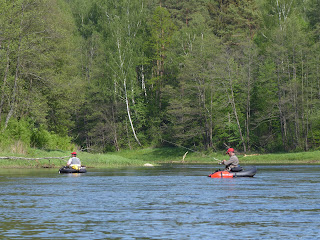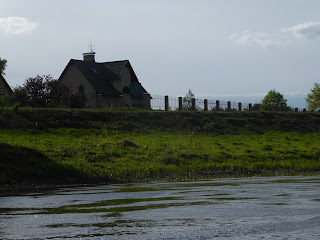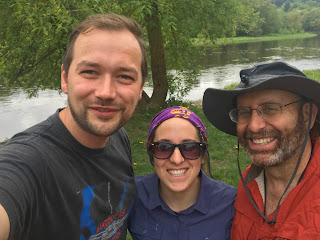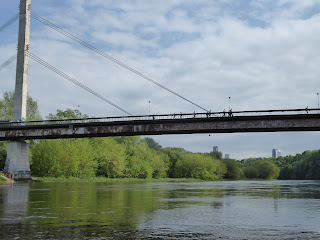Or chadash al tziyon ta-ir v'nizkeh kulanu m'heyra l'oro--A new light shall shine on Zion--may we all speedily benefit from its illumination!
Initially, many of the Sages opposed the insertion of this phrase into the Yotzer Or blessing, which offers thanks for morning's light and reminds us that light that marks the beginning of God's creation. This brachah has a universalist focus--all of the Holy One's creatures benefit from the blessing of sunlight--and tends toward the literal, while the inserted passage speaks of a more metaphorical--and tribal--radiance, about the Jewish people's longing for the land of Israel. For many of the Rabbis, it was dissonant with the prayer's primary theme. But the ordinary people wanted to include it and, as usual in such matters, they won the day. It stuck. The illuminating vision of a Zion restored, enlightening the world, must have provided hope and pride in hard times. And there were a lot of hard times.
Centuries later, the Zionist movement sought to transform the sentiment of this prayer into a geo-political reality through largely secular means. My Litvak family witnessed the birth of modern Zionism at the end of the 19th century. My great grandfather's brother, Rabbi Shimon Finkelstein became an early Orthodox Zionist. During a visit to the land of Israel in the late 1920s or early 1930s, he became friendly with Rav Abraham Isaac Kook, the first Ashkenazi chief rabbi of Palestine and a seminal Zionist voice in the Orthodox community. I can only assume that the views of his brother, Rabbi Mendel Finkelstein, were similar. Both Shimon and Mendel Finkelstein died in 1947, one year before the state of Israel was born. Mendel's grandson--my father, Rabbi Arnold Fink--celebrated his Bar Mitzvah just weeks after Israel declared its independence on May 14, 1948. Alas, Dad never met his grandfather.
From the start, Zionism was a fractious endeavor. It divided the Litvak community, as it did the rest of the Jewish world. Despite the support of some in the Orthodox community such as Rav Kook and the Rabbis Finkelstein, it was largely a secular and often socialist movement. Many of the ultra-Orthodox here in Lithuania bitterly opposed it. So did the anarchists and revolutionaries on the far left. This community was full of warring ideologies: Orthodox and secular, Zionists and socialists and communists of all varieties. Families and communities split over the philosophical battles of the day.
What did Litvaks make of these words--or chadash, a new light in Zion? How did they hear them? Were they taken as an ancient theological yearning or a current clarion call for political charge? For God or humanity? And how many, as tragedy loomed, might have envisioned the new light dawning in the east?
**********
We set out on the river by 9:30 am--for all of thirty minutes. Then we stop at Kernave, on the right bank. It's a national park and UNESCO World Heritage site--an archaeological work in progress. We walk through the remains of a fortress settlement that was the seat of Lithuanian power, culture, and civilization in the 13th and 14th centuries, before Grand Duke Gediminas established Vilnius as his capitol and built a small empire from there. But Kernave's roots go back much farther, with Paleolithic settlements. Relics from the Stone Age, Bronze Age, and Iron Age have all been excavated here. Civilization centered on the river valley. The Neris river, which we've been paddling, made this place a hub for transportation, farming, and trade.
In 1253, Lithuania's first and only king, Mindaugus, was coronated here. He defeated or eliminated most of his rivals--primarily family members--and made this city the seat of his throne. He built up the natural earth mounds and fortified them, then ruled from here with an iron fist. For a time he converted to Catholicism, in order to garner the support of Pope Innocent in his battle with the crusader Teutonic Order, then reverted to paganism. Lithuanians were wont to follow that path, remaining the last pagan bastion of Europe despite much pressure to become Christian. This land lent itself to paganism, with its dense forests, full of nymphs and fairies, devils and spirits.
Did any of this affect the Jews? We don't know. We lack any good evidence for when the first Jews arrived here, though some scholars propose that they were an offshoot of the Khazar kingdom who came in the 9th century. But whenever the first Jewish settlers made their way into Lita, they, too, settled in the river valleys, in the shadow of the forests. Many worked in those woods, harvesting timber and sending it down the rivers for trade. Like most of the citizens of their era, I suspect they both revered and feared the forest, which writer Robert Pogue Harrison calls "the shadow of civilization." Once they arrived, the Jews put down roots, living, loving, and laboring here for centuries. Alas, many would die tragically here, too.
**********
After Kernave, we get back in our boat and kayak until lunch, which we enjoy on a bucolic little island, then continue downstream, working fairly hard as the current atrophies. The river grows placid and lake-like, which means less floating and more paddling. And the landscape becomes less forested and more agrarian. We start to pass numerous houses, many quite nice--more likely summer homes for the well-to-do than country peasant dwellings. We're taken aback by the amount of new, upscale construction out here.
We have a short conversation with a man catching a local ferry across the river with his motorcycle. He greets us with Laba diena--which we recognize as Good afternoon, since Rosa and I are trying to study a few minutes of Lithuanian every day, using an app that I downloaded on my cell phone.
We ask: "English?"
He responds: "Where are you going?"
Us: "Kaunas."
He laughs and says, "Straight down the river."
Although it's not much, it is, nonetheless, our first real river dialogue of any sort with locals, so it's a start. Things are looking up. And after the ferry station, the river straightens out, with far less meandering. This makes for a bit of dull paddling, but decent downstream speed. We're making time again.
We ask: "English?"
He responds: "Where are you going?"
Us: "Kaunas."
He laughs and says, "Straight down the river."
Although it's not much, it is, nonetheless, our first real river dialogue of any sort with locals, so it's a start. Things are looking up. And after the ferry station, the river straightens out, with far less meandering. This makes for a bit of dull paddling, but decent downstream speed. We're making time again.
During our last paddling break, around 5 pm, I take a bath. I strip down, jump in, soap, wash, hop out and towel dry--all within about two minutes because both the air and the water are chilly! Still, it's refreshing and feels so good to be a little cleaner. Two hours later we make camp. As per our now standard routine, I set up and pitch the tent while Rosa starts the cooking. We're working well together here, too.
The mosquitos buzz around in thick clouds, so we eat quickly, then retreat into the tent, where we play gin rummy and get ready for bed.
**********
One last observation: rural Lithuanians like their weed wackers. We hear the rumble and roar of weed wackers everywhere! This makes sense, as everything organic grows like gangbusters here--especially weeds. The dense overgrowth that makes it challenging to find a decent campsite speaks to this reality. So Rosa and I laugh at our version of the soundtrack of Lithuania's countryside:
"Cuckoo! Cuckoo! Rrrrrrrrrrr (weed wacker sound!). Cuckoo! Rrrrrr!"
Repeat ad infinitude.
"Cuckoo! Cuckoo! Rrrrrrrrrrr (weed wacker sound!). Cuckoo! Rrrrrr!"
Repeat ad infinitude.





































































